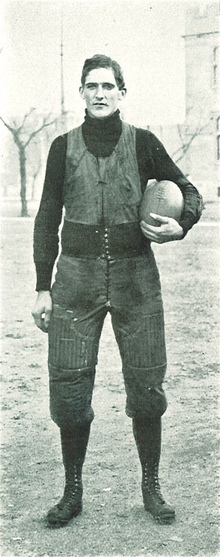Mark Catlin

Catlin from 1907 Hawkeye
|
|
| Sport(s) | Football, basketball |
|---|---|
| Biographical details | |
| Born |
November 12, 1882 Aurora, Illinois |
| Died | May 16, 1956 (aged 73) Appleton, Wisconsin |
| Playing career | |
| Football | |
| 1905 | Chicago |
| Position(s) | End |
| Coaching career (HC unless noted) | |
| Football | |
| 1906–1908 | Iowa |
| 1909–1918 | Lawrence |
| 1924–1927 | Lawrence |
| Basketball | |
| 1909–1912 | Lawrence |
| Head coaching record | |
| Overall | 63–40–7 (football) 15–13 (basketball) |
| Accomplishments and honors | |
| Championships | |
| Football 1 MVIAA (1907) |
|
| Awards | |
| All-American (1905) | |
Mark S. Catlin Sr. (November 12, 1882 – May 16, 1956) was an American football player, track athlete, coach, lawyer, and politician. He served as the head football coach at the University of Iowa from 1906 to 1908, and at Lawrence University from 1909 to 1918 and again from 1924 to 1927, compiling a career college football record of 63–40–7. Catlin played football at the University of Chicago and also participated in track and field competitions held adjunct to the 1904 Olympic Games. He later worked as an attorney and also served in the Wisconsin State Assembly from 1921 to 1923.
Born in Aurora, Illinois, Catlin played football at the University of Chicago under Amos Alonzo Stagg. He accounted for the only score in Chicago's 1905 victory over Michigan by tackling a Wolverine in the end zone for a safety. The Chicago victory broke Michigan’s 56-game unbeaten streak. He earned All-Western Conference honors at the end position, and he was named a second team All-American.
Catlin was also a brilliant field athlete. Catlin won in the broad jump and high and low hurdles and also competed in the hurdles and discus at the Olympic Collegiate Championships, held in St. Louis in June, before the 1904 Olympics, along with many other competitions that included the word "Olympics" in their title. At this competition he received gold medals in the 120 and 220 yd hurdles and silver in the discus. His time in the 120 yd hurdles (15 3-5s) bested that recorded in the official Olympics (16s). He graduated from Chicago in 1905. 100 years later, Catlin was elected to the University of Chicago's Hall of Fame in 2005.
...
Wikipedia
